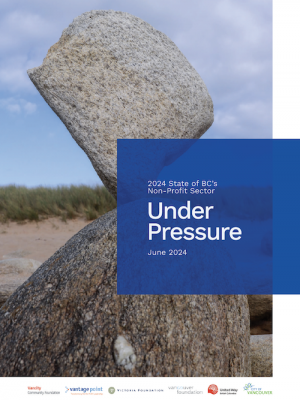 Under Pressure: 2024 State of BC’s Non-Profit Sector Report (from Vantage Point, Vancouver Foundation, Victoria Foundation, City of Vancouver, United Way British Columbia and Vancity Community Foundation) surveyed 558 nonprofit organizations and found: (1) expenses soared and all revenue sources decreased, except for government revenue; and (2) demand for services for clients and communities skyrocketed, while capacity to deliver those services remained the same. Read the full report, which includes recommendations to government, funders, sector stakeholders and partners.
Under Pressure: 2024 State of BC’s Non-Profit Sector Report (from Vantage Point, Vancouver Foundation, Victoria Foundation, City of Vancouver, United Way British Columbia and Vancity Community Foundation) surveyed 558 nonprofit organizations and found: (1) expenses soared and all revenue sources decreased, except for government revenue; and (2) demand for services for clients and communities skyrocketed, while capacity to deliver those services remained the same. Read the full report, which includes recommendations to government, funders, sector stakeholders and partners.
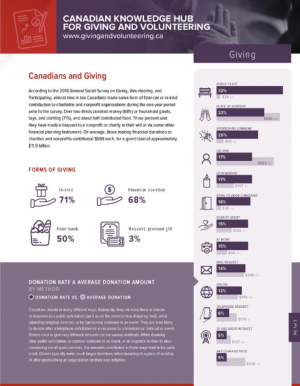 The Canadian Knowledge Hub for Giving and Volunteering is an online centre for data about giving and volunteering. It accesses a lot of data from a variety of sources, including a huge amount of data from Statistics Canada, such as data in the General Social Survey on Giving, Volunteering and Participating (GSS-GVP). The hub contains reports, resources, infographics and links to StatCan data about our sector. It was launched by Volunteer Canada in partnership with Imagine Canada, Ajah, Association of Fundraising Professionals of Canada, and Volunteer Management Professionals of Canada.
The Canadian Knowledge Hub for Giving and Volunteering is an online centre for data about giving and volunteering. It accesses a lot of data from a variety of sources, including a huge amount of data from Statistics Canada, such as data in the General Social Survey on Giving, Volunteering and Participating (GSS-GVP). The hub contains reports, resources, infographics and links to StatCan data about our sector. It was launched by Volunteer Canada in partnership with Imagine Canada, Ajah, Association of Fundraising Professionals of Canada, and Volunteer Management Professionals of Canada.
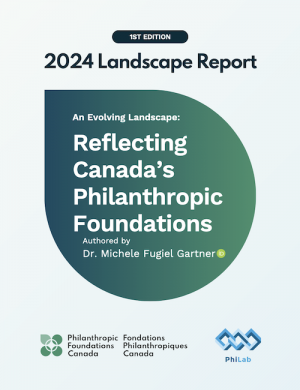 The 2024 Landscape Report: Reflecting Canada’s Philanthropic Foundations (from Philanthropic Foundations Canada and PhiLab) brings together previous literature and new information to provide an overview of foundations, such as “What do we know” (Chapter 1) and “What are the purposes, approaches, and roles of Canadian foundations” (Chapter 2). Regulation, asset investment and grantmaking are highlighted. PFC and PhiLab aim to release one report annually, starting with this 2024 Landscape report, which builds on PFC’s past research on foundation assets and giving trends.
The 2024 Landscape Report: Reflecting Canada’s Philanthropic Foundations (from Philanthropic Foundations Canada and PhiLab) brings together previous literature and new information to provide an overview of foundations, such as “What do we know” (Chapter 1) and “What are the purposes, approaches, and roles of Canadian foundations” (Chapter 2). Regulation, asset investment and grantmaking are highlighted. PFC and PhiLab aim to release one report annually, starting with this 2024 Landscape report, which builds on PFC’s past research on foundation assets and giving trends.
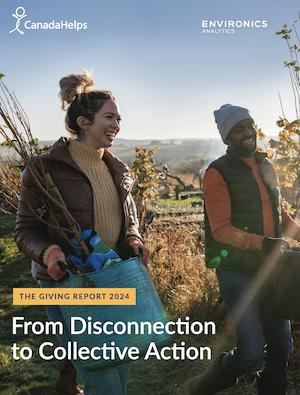 CanadaHelps collaborated with Environics Analytics and Imagine Canada to release The Giving Report 2024: From Disconnection to Collective Action. Aside from the usual data (the number of Canadians making donations has fallen again and more than half of charities can’t meet demands for their services), this Giving Report contains new information. For example, 32% of Canadians say climate change or protecting our environment is a top cause, but only 3.9% of donations are made to environmental charities or climate-driven crises, such as wildfires (see pages 26-31 of the 51-page pdf). Also, online giving is now stagnating (which, for years, has grown even as overall donations have fallen), but there are still bright spots in online activity (see pages 11-14). And, of course, the Supplemental Data Tables are full of thousands of searchable insights (pages 41-50).
CanadaHelps collaborated with Environics Analytics and Imagine Canada to release The Giving Report 2024: From Disconnection to Collective Action. Aside from the usual data (the number of Canadians making donations has fallen again and more than half of charities can’t meet demands for their services), this Giving Report contains new information. For example, 32% of Canadians say climate change or protecting our environment is a top cause, but only 3.9% of donations are made to environmental charities or climate-driven crises, such as wildfires (see pages 26-31 of the 51-page pdf). Also, online giving is now stagnating (which, for years, has grown even as overall donations have fallen), but there are still bright spots in online activity (see pages 11-14). And, of course, the Supplemental Data Tables are full of thousands of searchable insights (pages 41-50).
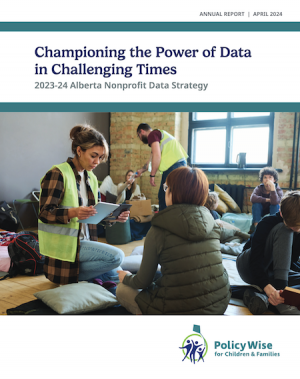 Funded by the Edmonton Community Foundation and supported by PolicyWise for Children & Families, the eight-page Championing the Power of Data in Challenging Times: 2023-2024 Alberta Nonprofit Data Strategy combines previous information and current analyses to provide a basic overview about the nonprofit sector’s impact in Alberta, as well as challenges and priorities.
Funded by the Edmonton Community Foundation and supported by PolicyWise for Children & Families, the eight-page Championing the Power of Data in Challenging Times: 2023-2024 Alberta Nonprofit Data Strategy combines previous information and current analyses to provide a basic overview about the nonprofit sector’s impact in Alberta, as well as challenges and priorities.
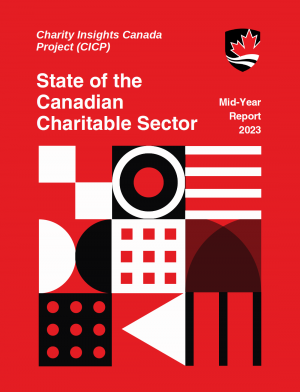 The State of the Canadian Charitable Sector 2023 Mid-Year Report, from the Charity Insights Canada Project (CICP) / Projet Canada Perspectives des Organismes de Bienfaisance (PCPOB), summarizes two dozen weekly surveys of approximately 1,000 registered charities between December 2022 and June 2023. Findings include: (1) charities are seeing rises in demand and increases in costs associated with their services, impacting organizations’ abilities to support and retain personnel; (2) charities are embracing equity, diversity, and inclusion (EDI initiatives, striving to realize representative demographics within their workplaces; and (3) certain disparities, particularly in gender representation, underscore the necessity for heightened awareness and targeted action in specific leadership roles. Click here for the CICP-PCPOB’s State of the Canadian Charitable Sector 2023 Mid-Year Report.
The State of the Canadian Charitable Sector 2023 Mid-Year Report, from the Charity Insights Canada Project (CICP) / Projet Canada Perspectives des Organismes de Bienfaisance (PCPOB), summarizes two dozen weekly surveys of approximately 1,000 registered charities between December 2022 and June 2023. Findings include: (1) charities are seeing rises in demand and increases in costs associated with their services, impacting organizations’ abilities to support and retain personnel; (2) charities are embracing equity, diversity, and inclusion (EDI initiatives, striving to realize representative demographics within their workplaces; and (3) certain disparities, particularly in gender representation, underscore the necessity for heightened awareness and targeted action in specific leadership roles. Click here for the CICP-PCPOB’s State of the Canadian Charitable Sector 2023 Mid-Year Report.
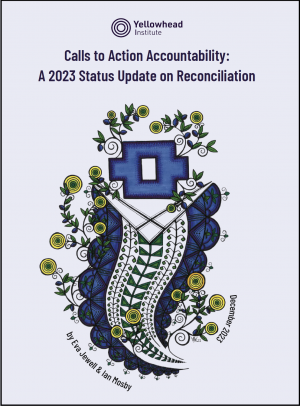 Eighty-one out of 94 Calls to Action remain unfulfilled eight years after the Truth and Reconciliation Commission of Canada released its final report, Honouring the Truth, Reconciling for the Future (2015). This year, Yellowhead Institute’s Calls to Action Accountability: A 2023 Status Update on Reconciliation explains the inaction and what it means for the future. For example, the authors, Eva Jewell and Ian Mosby, identify five challenges: (1) paternalism; (2) structural anti-Indigenous discrimination; (3) exploiting Indigenous land in “the public interest”; (4) insufficient resources; and (5) performative measures and actions, as in the case of “economic reconciliation,” that serve as window dressing to manage Canada’s reputation. And the authors explain that when there is concrete action, such as the $23 billion settlement for Indigenous children and their families, “it doesn’t come from Canada (which can’t manage a single Call to Action in a year) but from Indigenous peoples, who fiercely advocate for themselves and resist the full weight of Canadian intransigence.” This special report from Yellowhead Institute is a must read.
Eighty-one out of 94 Calls to Action remain unfulfilled eight years after the Truth and Reconciliation Commission of Canada released its final report, Honouring the Truth, Reconciling for the Future (2015). This year, Yellowhead Institute’s Calls to Action Accountability: A 2023 Status Update on Reconciliation explains the inaction and what it means for the future. For example, the authors, Eva Jewell and Ian Mosby, identify five challenges: (1) paternalism; (2) structural anti-Indigenous discrimination; (3) exploiting Indigenous land in “the public interest”; (4) insufficient resources; and (5) performative measures and actions, as in the case of “economic reconciliation,” that serve as window dressing to manage Canada’s reputation. And the authors explain that when there is concrete action, such as the $23 billion settlement for Indigenous children and their families, “it doesn’t come from Canada (which can’t manage a single Call to Action in a year) but from Indigenous peoples, who fiercely advocate for themselves and resist the full weight of Canadian intransigence.” This special report from Yellowhead Institute is a must read.
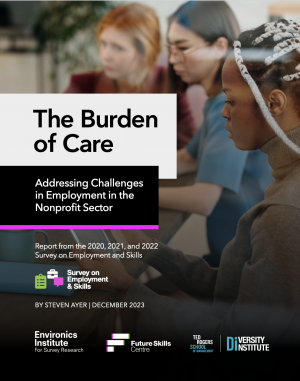 The Burden of Care: Addressing Challenges in Employment in the Nonprofit Sector (Dec. 2023) is a report from the Environics Institute for Survey Research, in partnership with the Future Skills Centre and the Diversity Institute at Toronto Metropolitan University. The report is based on the 2020, 2021 and 2022 Survey on Employment and Skills (funded primarily by the Government of Canada’s Future Skills Centre), using results from 639 respondents who worked in the nonprofit sector and more than 11,000 respondents who worked in the public and private sectors. The report concludes that workers in the nonprofit sector have lower job satisfaction than workers in either the public or private sectors. Nonprofit sector jobs are also quite precarious, with high rates of temporary and part-time employment, including many workers who are involuntarily part-time. Download the report here.
The Burden of Care: Addressing Challenges in Employment in the Nonprofit Sector (Dec. 2023) is a report from the Environics Institute for Survey Research, in partnership with the Future Skills Centre and the Diversity Institute at Toronto Metropolitan University. The report is based on the 2020, 2021 and 2022 Survey on Employment and Skills (funded primarily by the Government of Canada’s Future Skills Centre), using results from 639 respondents who worked in the nonprofit sector and more than 11,000 respondents who worked in the public and private sectors. The report concludes that workers in the nonprofit sector have lower job satisfaction than workers in either the public or private sectors. Nonprofit sector jobs are also quite precarious, with high rates of temporary and part-time employment, including many workers who are involuntarily part-time. Download the report here.
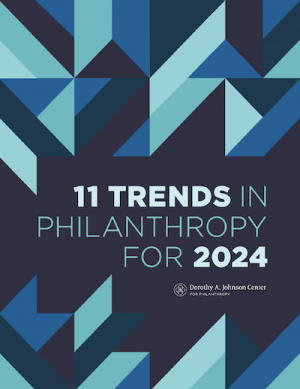 The US-based Dorothy A. Johnson Center for Philanthropy released its annual trends report, 11 Trends in Philanthropy for 2024, a detailed analysis of philanthropy as it relates to: (1) the “increase of incarcerated students enrolled in higher education;” (2) philanthropy as it relates to “Asian American and Pacific Islander Communities;” (3) philanthropy as it relates to the southern US; and (4) “With Crisis Comes Change: Black Women and the Glass Cliff.” For the other seven trends, download the full, 11-trend report here.
The US-based Dorothy A. Johnson Center for Philanthropy released its annual trends report, 11 Trends in Philanthropy for 2024, a detailed analysis of philanthropy as it relates to: (1) the “increase of incarcerated students enrolled in higher education;” (2) philanthropy as it relates to “Asian American and Pacific Islander Communities;” (3) philanthropy as it relates to the southern US; and (4) “With Crisis Comes Change: Black Women and the Glass Cliff.” For the other seven trends, download the full, 11-trend report here.
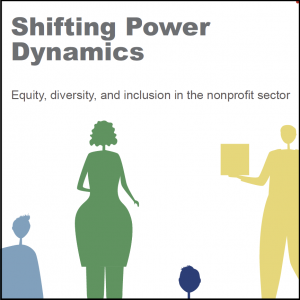 Shifting Power Dynamics: Equity, Diversity, and Inclusion in the Nonprofit Sector (2023) is a 62-page slideshow that summarizes results from a survey of 1,655 charities and nonprofit groups. Led by the Equitable Recovery Collective and Imagine Canada, the report explores what Canadian charities and nonprofits are doing to advance equity, diversity, and inclusion (EDI) within their organizations. One finding: despite experiencing increased expectations and facing greater barriers, organizations with leadership from Black, Indigenous, racialized communities and other underrepresented groups are doing more than their white-led counterparts to advance EDI in the sector.
Shifting Power Dynamics: Equity, Diversity, and Inclusion in the Nonprofit Sector (2023) is a 62-page slideshow that summarizes results from a survey of 1,655 charities and nonprofit groups. Led by the Equitable Recovery Collective and Imagine Canada, the report explores what Canadian charities and nonprofits are doing to advance equity, diversity, and inclusion (EDI) within their organizations. One finding: despite experiencing increased expectations and facing greater barriers, organizations with leadership from Black, Indigenous, racialized communities and other underrepresented groups are doing more than their white-led counterparts to advance EDI in the sector.
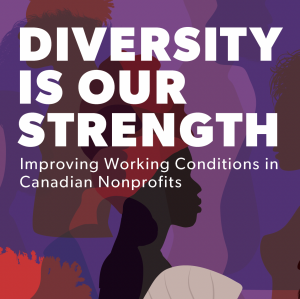 Data from Diversity Is Our Strength: Improving Working Conditions in Canadian Nonprofits, from Imagine Canada (2022), demonstrates that our sector’s workforce is diverse but undervalued: 77% of nonprofit workers are women; 47% are immigrants; and 35% of the workforce is Indigenous and racialized. And workers tend to be older and better educated than the economy-wide averages, but they face lower salaries and difficult employment conditions. The report lists the immediate action needed from funders, governments and nonprofit leaders.
Data from Diversity Is Our Strength: Improving Working Conditions in Canadian Nonprofits, from Imagine Canada (2022), demonstrates that our sector’s workforce is diverse but undervalued: 77% of nonprofit workers are women; 47% are immigrants; and 35% of the workforce is Indigenous and racialized. And workers tend to be older and better educated than the economy-wide averages, but they face lower salaries and difficult employment conditions. The report lists the immediate action needed from funders, governments and nonprofit leaders.
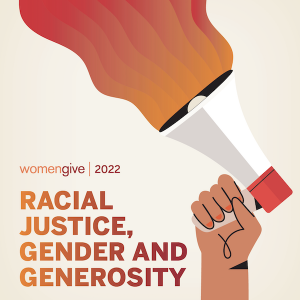 Women have become ever more influential in philanthropy, and they give differently than men. Women Give 2022: Racial Justice, Gender and Generosity (2022) is a report from the Women’s Philanthropy Institute, at Indiana University’s Lilly Family School of Philanthropy, that analyzes how U.S. households, and particularly women, supported racial justice causes. About one in seven U.S. households gave money to support racial justice causes and organizations in 2020, and single women were more likely to give to these causes than single men or couples. And women are more likely than men to “view all of their resources—not just their money but also their time, expertise, and networks—as tools with which to do good.” The greater likelihood of women to contribute their time and talent, as well as money, has also been found in Canada, although we don’t have good data on giving to racial justice causes.
Women have become ever more influential in philanthropy, and they give differently than men. Women Give 2022: Racial Justice, Gender and Generosity (2022) is a report from the Women’s Philanthropy Institute, at Indiana University’s Lilly Family School of Philanthropy, that analyzes how U.S. households, and particularly women, supported racial justice causes. About one in seven U.S. households gave money to support racial justice causes and organizations in 2020, and single women were more likely to give to these causes than single men or couples. And women are more likely than men to “view all of their resources—not just their money but also their time, expertise, and networks—as tools with which to do good.” The greater likelihood of women to contribute their time and talent, as well as money, has also been found in Canada, although we don’t have good data on giving to racial justice causes.
Archive of Top Reports
Banner photo is courtesy of Jeremy Bishop.
